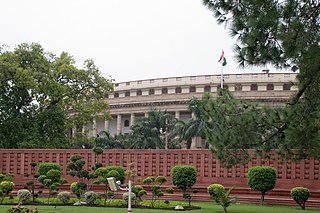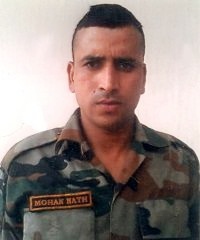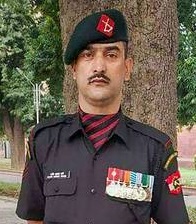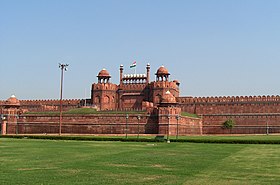
Lashkar-e-Taiba is a Pakistan-based militant Islamist Salafi jihadist organisation. Described as one of Pakistan's "most powerful jihadi groups", it is most infamous outside Pakistan. The organisation's primary stated objective is to merge the whole of Kashmir with Pakistan. It was founded in 1985–86 by Hafiz Saeed, Zafar Iqbal Shehbaz Abdullah Azzam and several other Islamist mujahideen with funding from Osama bin Laden during the Soviet–Afghan War. It has been designated a terrorist group by numerous countries.

The 2001 Indian Parliament attack was a terrorist attack on the Parliament of India in New Delhi, India on 13 December 2001. The attack was carried out by five armed assailants that resulted in the deaths of six Delhi Police personnel, two Parliament Security Service personnel, and a gardener. All the five terrorists were killed by security forces.

India–Pakistan relations are the bilateral ties between the Republic of India and the Islamic Republic of Pakistan. The two countries have a complex and largely hostile relationship that is rooted in a multitude of historical and political events, most notably the partition of British India in August 1947.

Hafiz Muhammad Saeed is a Pakistani Islamist who co-founded Lashkar-e-Taiba (LeT), a Pakistan-based Islamist militant organization that is designated as a terrorist group by the United Nations Security Council, India, the United States, the United Kingdom, the European Union, Australia, and Russia. He is listed on India's NIA Most Wanted. In April 2012, the United States placed a bounty of US$10 million on Saeed for his role in the 2008 Mumbai attacks that killed 166 civilians. While India officially supported the American move, there were protests against it in Pakistan.
The Kaluchak Massacre was a terrorist attack on 14 May 2002 near the town of Kaluchak in the Indian state Jammu and Kashmir. Three militants attacked a Himachal Road Transport Corporation bus from the Indian state of Himachal Pradesh from Manali to Jammu and killed 7 people. After that they entered the family quarter of the Army and fired indiscriminately at the inmates, killing 23 persons, including 10 children, eight women and five Army men. The age of the children killed ranged from four to 10 years. Thirty-four people were injured in the attack.
2006 Doda Massacre refers to the massacre of 35 Hindu civilians by Lashkar-e-Taiba militants in the Doda district of Jammu and Kashmir, India on 30 April, 2006.
Attribution of the 2008 Mumbai attacks were first made by the Indian authorities who said that the Mumbai attacks were directed by Lashkar-e-Taiba militants inside Pakistan. American intelligence agencies also agree with this attribution. Pakistan initially contested this attribution, but agreed this was the case on 7 January 2009. To back up its accusations, the Indian government supplied a dossier to Pakistan's high commission in Delhi. The Pakistan government dismissed the dossier as "not evidence," but also announced that it had detained over a hundred members of Jamaat-ud-Dawa, a charity linked with Lashkar-e-Taiba. In February 2009, Pakistan's Interior Minister Rehman Malik agreed that "some part of the conspiracy" did take place in Pakistan.
Zakiur Rehman Lakhvi is a Pakistani Islamist militant, terrorist, and co-founder of Lashkar-e-Taiba. One of the prime perpetrators in the 2008 Mumbai Attacks, he features on India's NIA Most Wanted list. In January 2021, he was arrested by Pakistani authorities and sentenced to three concurrent five-year sentences in jail for terror financing in an unrelated case.
During and immediately after the 2008 Mumbai attacks the news media worldwide broadcast incorrect factual information on a scale often seen in a fog of war. Erroneous reporting on the 2008 Mumbai attacks included false information concerning the number of attackers, their nationality, their organizational affiliations, origins, and the methods of transport they had used. Theories and speculations were openly aired by various commentators that were later proved to be wrong. Many such speculations, such as the involvement in the attacks of the "Deccan Mujahideen", were widely reported by media worldwide. Various news outlets carried opinion pieces and unattributed theories about the origins of the attackers which were unfounded.
The 2010 Pune bombing, also known as 13/7 and the German bakery blast, occurred on 13 February 2010 at approximately 19:15 Indian Standard Time, when a bomb exploded at a German bakery in the Indian city of Pune, Maharashtra. The blast killed 18 people, and injured at least 60 more, including an Italian woman, two Sudanese students and an Iranian student.
Sayed Zabiuddin Ansaria.k.a.Abu Hamza or Abu Jundal is an Indian Islamic militant belonging to Indian Mujahideen and Lashkar-e-Taiba. He is accused of being involved in 2008 Mumbai attacks. Zabiuddin Ansari 's name was listed in the list of "50 most wanted criminals sheltered in Pakistan" released by India on 21 May 2011. He served as the handler of the 10 LeT terrorists during 2008 Mumbai attacks.
An attack on a Central Reserve Police Force camp at Bemina, Srinagar, Jammu and Kashmir, India, occurred on 13 March 2013. It resulted in the death of five CRPF personnel and two attackers. Ten others were also injured include security personnels and civilians.

Lance Naik Mohan Nath Goswami AC was a soldier in the 9 Para (SF) of the Parachute Regiment of the Indian Army. He was posthumously awarded the Ashoka Chakra, India's highest peacetime military decoration. On 3 September 2015, while serving with the 9th battalion of the Parachute Regiment, Goswami was killed in an ambush operation while fighting four terrorists in Kupwara district, Jammu and Kashmir. For his actions in Kupwara, he was posthumously awarded the Ashoka Chakra.
On 20 February 2016, 4 Lashkar-e-Taiba terrorists armed with AK-47 Assault rifles, UBGL, hand grenades, and explosives attacked a CRPF convoy on the main road linking Srinagar to Jammu, killing two police men and a civilian. The militants then took refuge in the government-run multi-story "Entrepreneurship Development Institute" in Pampore. Units of the Indian Army and Central Reserve Police Force cordoned off the building and launched a joint operation to evacuate civilians from the building. For Security forces, their main focus was to evacuate civilians to safety. Army and CRPF launched a joint operation with armored vehicles to evacuate 120 civilians from the building. The militants responded with automatic gunfire and hand grenades. During the ensuing battle, three soldiers from Indian Army lost their lives. Captain Pawan Kumar from 10 Para Special Forces, Captain Tushar Mahajan & Lance Naik Om Prakash from 9 Para Special Forces lost their life. Capt. Pawan Kumar from Army's 10 Para Special Forces unit lost his life on the first day during the firefight, a terrorist was also killed in the firefight. After the firefight part of the EDI building caught on fire.
On 10 July 2017, the first Monday of the month of Shraavana, 8 Hindu civilian pilgrims on the way from Amarnath Temple in Kashmir Valley, in the Indian state of Jammu and Kashmir, were killed in a terror attack. The pilgrims mostly belonged to the Indian state of Gujarat. Eight people were killed and at least 18 people were injured in the attack.

Indian Army operations in Jammu and Kashmir include security operations such as Operation Rakshak, which began in 1990, Operation Sarp Vinash in 2003 and Operation Randori Behak in 2020. Other operations include humanitarian missions such as Operation Megh Rahat and operations with a social aim such as Operation Goodwill and Operation Calm Down. The Indian Army works in tandem with the other arms of the Indian Armed Forces and security forces in Jammu and Kashmir such as during Mission Sahayata or joint operations.

Ansar Ghazwat-ul-Hind is an Al-Qaeda-affiliated Islamist militant group active in Kashmir. The group's stated objective is to create Kashmir as an independent Islamic state under Sharia law and jihad against India.

Lance Naik Nazir Ahmad Wani, AC, SM & Bar was an Indian Army soldier and a recipient of the Ashoka Chakra, India's highest peacetime military decoration.At the time of his death, he was serving with an auxiliary battalion of the army's Jammu and Kashmir Light Infantry Regiment, the 162nd Infantry Battalion of the Territorial Army .He was posthumously awarded the Ashoka Chakra for his actions during a counterterrorism operation in which his unit was attached with the 34th Rashtriya Rifles battalion. He was the first recipient of the Ashok Chakra from Jammu and Kashmir.

Sajid Mir is a Pakistani national from Lahore and a member of the militant organisation Lashkar-e-Taiba. Sajid Mir was the chief planner of the terrorist attacks in Mumbai, during 26 November 2008. Sajid had also managed the tasks of the 'foreign affairs' of Lashkar-e-Taiba's international wing.

The People’s Anti-Fascist Front (PAFF) is a militant terrorist organization actively engaged in insurgency in Jammu and Kashmir, an ongoing armed conflict between Kashmiri separatist militants and Indian forces in Jammu and Kashmir. PAFF was established in 2020 by Jaish-e-Mohammad or Lashkar-e-Taiba, two Pakistan-based Jihadist groups.










